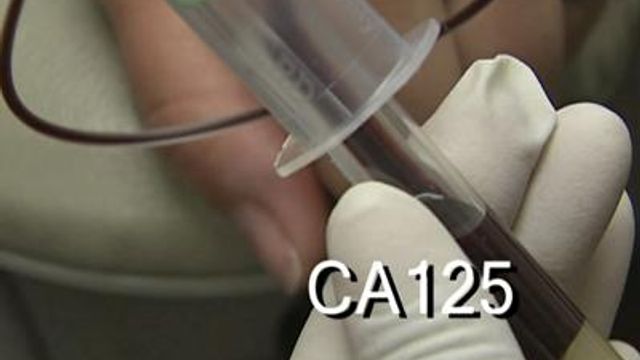Ovarian cancer tests aren't for all women
Late diagnoses often make ovarian cancer deadly for the 20,000 American women who contract it annually. Research, though, indicates early testing is inaccurate and effective only for a small group of high-risk women.
Posted — UpdatedLate diagnoses often make ovarian cancer deadly for the 20,000 American women who contract it annually. Research, though, indicates early testing is inaccurate and effective only for a small group of high-risk women.
About eight years ago, Amy Brannock, 52, learned that she had ovarian cancer.
"I was really lucky, because I was diagnosed at an early stage," Brannock said.
She had a hysterectomy and chemotherapy, but the cancer returned. More surgery and more chemo followed, and then she had CA-125 blood tests to detect signs of a third recurrence.
The tests were negative, but the cancer did return – in a lymph node on her neck.
"We learned the lesson at that point that that (test) wasn't a good marker for me," Brannock said.
Research by doctors at UNC Hospitals in Chapel Hill shows that the CA-125 test misses over half of early ovarian cancers. Transvaginal ultrasounds, used to find visual abnormalities in the ovaries, catch only one out of 10 cancers.
Positive results on both tests can lead to unnecessary surgery.
"The only way we can really diagnose ovarian cancer is by removing the ovaries," said Dr. Daniel Clark-Pearson, a gynecologist with UNC Hospitals.
Clark-Pearson led a study, published in the New England Journal of Medicine, that found that screening for ovarian cancer shouldn't be done in the general population.
"(For) very, very high-risk women, we believe screening would be worthwhile by doing ultrasounds and CA-125," he said.
Women at high-risk for ovarian cancer induce those with breast cancer, a family history of breast or ovarian cancer, or mutations in the BRCA1 and BRCA2 genes.
Women age 50 or older should watch out for vague symptoms experienced more than 12 times a month. Symptoms include pelvic or abdominal pain, increased or more urgent urinary frequency, increased abdominal size or bloating, or difficulty eating or feeling full soon after eating.
Brannock sees her cancer as chronic but treatable. For other women, she says, see your gynecologist.
"Be seen regularly for those check-ups, and pay attention to your body," she said.
• Credits
Copyright 2024 by Capitol Broadcasting Company. All rights reserved. This material may not be published, broadcast, rewritten or redistributed.





